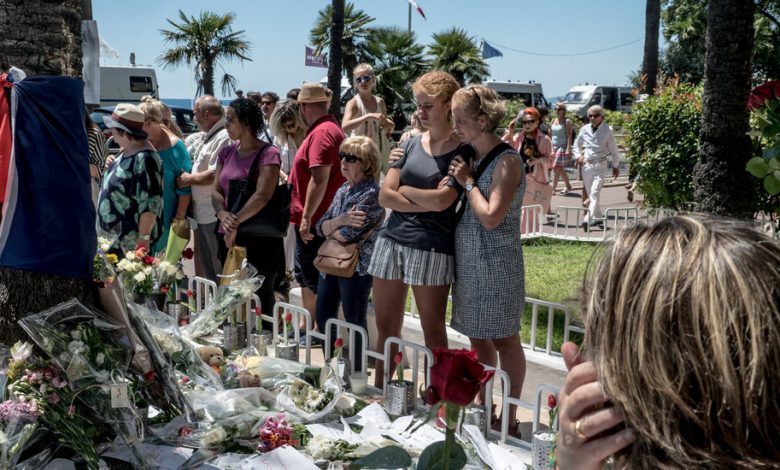French Court Convicts 8 of Aiding 2016 Terrorist Attack in Nice

A French court on Tuesday found 8 defendants guilty of aiding in the terrorist attack that killed 86 people in the Mediterranean city of Nice in 2016, after a trial that offered some closure to survivors and the bereaved but did little to clarify the motives behind the massacre. Sentences ranged from two to 18 years in prison.
But in the absence of the perpetrator, Mohamed Lahouaiej Bouhlel, who was killed by the police at the time, the vague answers of low-level accomplices provided scant further information about the attack.
The Nice attack, which took place on the seaside Promenade des Anglais in the city, was one of the bloodiest in a series of Islamist terrorist assaults in Europe over a span of a few years — in Paris, Brussels, Berlin and Barcelona.
For about three and a half months, hundreds of people — defendants, survivors, bereaved families, lawyers and experts — took to the stand in Paris to try to determine what had led Mr. Lahouaiej Bouhlel, a 31-year-old Tunisian, to swerve a 19-ton truck through crowds as they were leaving Bastille Day fireworks.
Coming on the heels of monthslong trials in the 2015 Charlie Hebdo and Paris attacks, the verdict on Tuesday was the latest in an extraordinary two-year judicial cycle that revisited events that have shaped contemporary France. The hearings often echoed broader societal debates over French identity, the place of Islam in a country that identifies itself as secular and the balance between individual liberty and collective security.
“All of this crystallized in these three major trials,” said Antoine Mégie, a political scientist at the University of Rouen, adding that the testimonies in court also served to “build the memory of attacks” that deeply traumatized France.
The series of high-profile terrorism trials continues elsewhere in Europe. The trial of the 2016 Brussels bombings, which killed 32 people, opened last week in Belgium and is expected to last until next summer.
In the Paris courtroom, relatives of Mr. Lahouaiej Bouhlel described a man suffering from serious psychological disorders, prone to domestic violence and obsessed with sex. His sister told the court, “I was really afraid of him, everyone was afraid of him.”
But none of the testimony uncovered the deeper motives behind his crime. Although the Islamic State claimed that Mr. Lahouaiej Bouhlel was one of its “soldiers,” there is no evidence that he was actually linked to the terrorist group. His family said that he had become interested in Islam only weeks before the attack, and investigators said that he self-radicalized within days by watching jihadist videos.
The evidence given by the defendants hardly helped to clarify the picture. They were indirect accomplices, having helped Mr. Lahouaiej Bouhlel rent the truck and buy a gun, and they apparently had little or no clue about the preparation of the attack. Text messages that Mr. Lahouaiej Bouhlel sent them did not provide clear evidence that they had been aware of his intentions.
Alexa Dubourg, one of the public prosecutors, acknowledged as much in her closing speech last week. “To hold all those responsible accountable does not mean to put the burden of the absentee on the accused,” she said. “What will be fair is if the sentences are proportionate to the responsibility of each person.”
The sentences announced on Tuesday can be appealed.
During the trial, lengthy hearings were held for the testimonies of survivors and families of the victims, plunging the court into five weeks of heartbreaking suffering. Apart from those killed, hundreds more were wounded in the attack. Some witnesses described the crushed bodies lying on the promenade and desperately searching for a parent’s missing limb. Others recounted the agonizing wait to learn that a loved one had been among the victims and the difficult, if not impossible, path to recovery.
Whether the trial has helped them come to terms with the shocking events was uncertain.
Some of the family members and survivors did not hide the hatred they feel toward the defendants. Many also expressed resentment at what they described as a cumbersome and harrowing process to obtain compensation from France’s official victims’ fund.
Unlike the trial for the November 2015 Paris attacks, when the court was often packed with journalists, bereaved family members, survivors and other onlookers, the hearings on the Nice attack were mostly sparsely attended. Many of the survivors have said that they are more concerned about the continuing investigation into the authorities’ possible failure to provide adequate security for the Bastille Day celebration. There is also emotional fatigue among the public after two years of wrenching terrorism trials.
The unprecedented legal cycle has highlighted profound changes in France that came about as a result of the attacks.
In the courtrooms, France’s new sweeping counterterrorism laws were questioned by lawyers who denounced an infringement of civil liberties. The country’s uneasy relationship with Islam was highlighted by testimonies that oscillated between lingering prejudice and calls for tolerance. Experts and politicians, including a former president, François Hollande, have warned about an evolving terrorist threat made up of isolated, self-radicalized individuals.
Mr. Mégie, the University of Rouen academic, noted that the proceedings had exposed as many scars as they had heeled.
“These trials provided a window on our society and many of its political issues,” he said.
